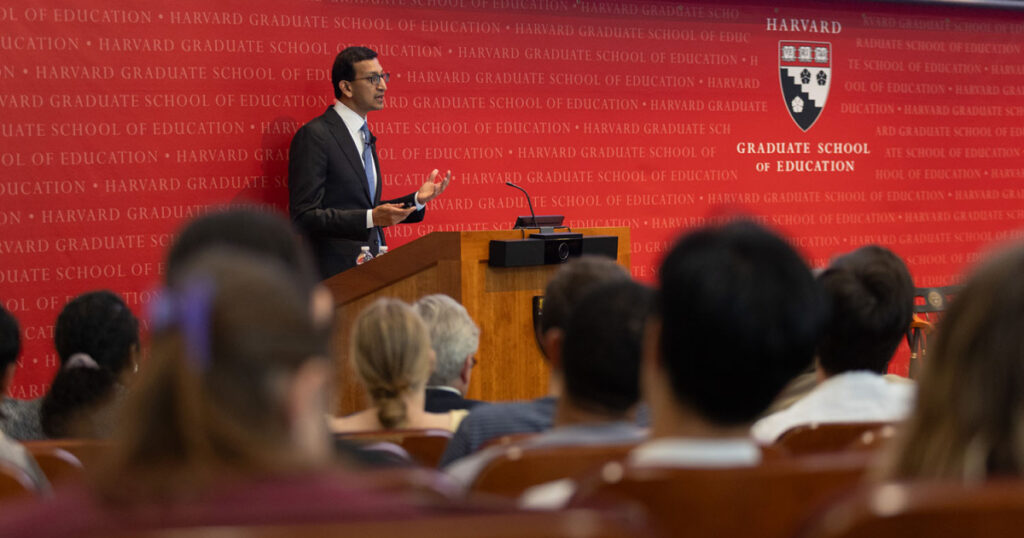By 2050, AI could make schools more personal and flexible.
In Ed School panel, Howard Gardner asserts technology may make ‘most cognitive aspects of mind’ unnecessary for humans
By 2050, schooling will be vastly different than it is today, says psychologist and social scientist Howard Gardner — developer of the theory of multiple intelligences — and Anthea Roberts, visiting professor at Harvard Law School and founder and CEO of AI tool Dragonfly Thinking

Gardner, who addressed a forum Wednesday at the Harvard Graduate School of Education, referred to AI as core a transformation to schooling as the world had witnessed in 1,000 years — and went so far as to express that it could make obsolete numerous aspects of mind for which he is renowned for attempting to describe.
“The requirement that everyone in the class be doing the same thing, graded in the same manner, will appear completely old-fashioned,” he said.
The forum, “Thinking in an AI-Augmented World,” was held in Longfellow Hall and hosted by Martin West, academic dean and Henry Lee Shattuck Professor of Education.
“AI is changing the face of education already in ways that everyone in the business, from policymakers and leaders on down to teachers, parents, and students, must be aware of,” West explained.
Gardner and Roberts presented visions of a system of AI-assisted education that were different from each other.
For Gardner, by around 2050, all children would require a few years of instruction in the Three R’s: “Reading, ‘riting, ‘rithmetic, and a little coding,” he explained. After that, teachers who functioned more as coaches would expose students to activities that would challenge their thinking, expose them to ideas, and guide them toward professions that excite them. “I don’t think going to school for 10 or 15 years as we’ve done it makes sense,” said Gardner, the John H. and Elisabeth A. Hobbs Research Professor of Cognition and Education. Roberts presented another vision. Where knowledge production was once “the actor on the stage, the athlete on the field, the writer of the book,” the next generation will have to be schooled to manage a team of AIs. “You are the director of the actor, you are the coach of the athlete, and you are the editor of the writer,” she explained. “It takes actually having very strong facilities in terms of how you’re engaging.
Gardner reported that artificial intelligence has caused him to reconsider some of his earlier notions regarding core thinking skills. Gardner’s theory of multiple intelligences, published in 1983’s “Frames of Mind,” described different kinds of intellectual ability: logical-mathematical, linguistic, musical, spatial, bodily-kinesthetic, interpersonal, and intrapersonal.
A later contribution, “Five Minds for the Future” (2005), posited five kinds of minds that education policy should aim to develop: the disciplined mind (learning subjects like history, biology or math); the synthesizing mind (putting strands of thought together in sensible ways); and the creating mind (“This is one we’re all interested in but it’s rare: It’s coming up with something new which actually sticks,” Gardner said).
Two additional modes — the ethical mind and the respectful mind — assist us with other individuals and with intractable problems in society. Three of the five, Gardner maintained, could soon be replaced by artificial intelligence.
I believe most of the intellectual functions of mind — the disciplined mind, the synthesizing mind, and the creative mind — will be accomplished so effectively by big language machines and mechanisms that whether humans do them or not will be optional,” he said.
Contrariwise, I do not think for one second that aspects of respect — how we treat other human beings — and ethics — how we treat difficult problems as citizens, as professionals — can or should be left to even the most sophisticated and multifaceted, smart machines.” The panelists recognized fears that students would unload intellectual labor on to AI, reducing their critical thinking capacity.
“You definitely will have the opportunity to cognitively offload,” Roberts said. “And you definitely will have the opportunity to cognitively expand. As individuals and as teachers, our responsibility is to attempt to figure out how we do that expansion as opposed to that replacement. There isn’t a straightforward answer to that yet.”
Roberts explained that she was forced to return her academic textbooks to the shelf and begin developing AI tools following a young colleague creating a “Robo-Anthea” that could speak fluently from her point of view.
“I now spend nearly all my time in continuous conversation with LLMs,” Roberts said, adding he is also a professor at the School of Regulation and Global Governance at the Australian National University. “Throughout all my academic work, I have Gemini, GPT, and Claude open and in conversation. … I feed their responses to one another. I’m continuously having a conversation between the four of us.”
